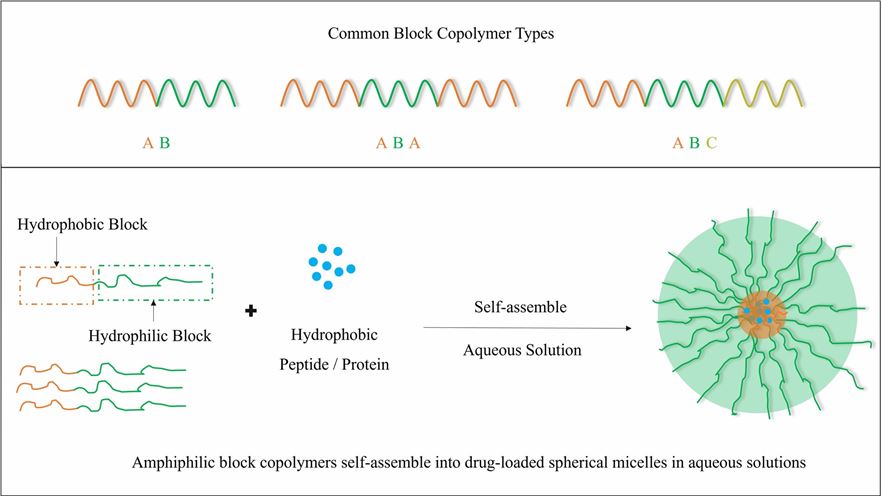Peptide & Protein Block Copolymer Micelle Development
InquiryAt CD Formulation, we utilize our expertise in engineering biocompatible block copolymer micelles to develop innovative drug delivery systems for a range of biologics like cytokines, enzymes and gene therapies. These technologies overcome the challenges in developing injectable formulations.
What are Block Copolymer Micelles?
Block copolymer micelles are polymer aggregates with a size less than 100 nanometers that are self-assembled by amphiphilic molecules. They consist of a hydrophobic core surrounded by a hydrophilic shell. This core-shell structure allows block copolymer micelles to efficiently encapsulate and deliver hydrophobic compounds including peptides, proteins and nucleic acids. Their nanoscale size enables prolonged circulation and passive targeting of tumors. Incorporation of stimuli-responsive blocks facilitates controlled intracellular release.
How Do We Prepare Block Copolymer Micelles for Peptide and Protein Delivery?

|
In this method, a block copolymer and the peptide/protein of interest are dissolved in a common solvent. The solvent is then evaporated, resulting in the self-assembly of the copolymer into micelles encapsulating the biomolecules. |
|
The block copolymer and the biomolecules are dissolved in different solvents that are miscible. Upon mixing, the copolymer and biomolecules interact, leading to micelle formation. |
|
A block copolymer and the biomolecules are co-dissolved in a solvent, and the solution is placed in a dialysis bag or dialysis membrane. The solvent is allowed to diffuse out, leaving behind micelles containing the encapsulated peptides/proteins. |
|
The block copolymer and biomolecules are dissolved in a common solvent, followed by the addition of a non-solvent. This induces precipitation and the formation of micelles entrapping the peptides/proteins. |
|
The block copolymer and biomolecules are directly dissolved in a suitable solvent, facilitating the self-assembly of the copolymer into micelles with encapsulated peptides/proteins. |
Our Commonly Used Amphiphilic Micelle Carrier Materials
| Types |
Hydrophilic Block |
Hydrophobic Block |
| Synthetic Polymer Materials |
PEG, PEO, PVP |
Polylactones: PLA, PDLA, HLA, LG, HLGA, PCL
Polycomplex acid: P(His), P(Glu), P(Asp), P(Lys), P(PBLA) |
| Natural Polymer Materials |
Propyl cellulose, amylopectin, chitosan, alginate, polyol gel, dextran, heparin |
Distearyl phosphatidyl ethanolamine, phosphatidyl ethanolamine, cholesterol, cholic acid, deoxycholic acid, lithocholic acid, casein, albumin |
Our Block Copolymer Micelle Analysis Services
- DLS measures the hydrodynamic size and size distribution of micelles, providing information about their stability and aggregation behavior.
- TEM enables visualization of micelle morphology and structural details at the nanoscale, offering insights into their shape, core-shell structure, and uniformity.
- AFM provides high-resolution imaging of micelles, allowing for the visualization of their surface morphology, roughness, and topographical features.
- Zeta potential analysis determines the surface charge of micelles, which affects their stability and potential interactions with biological systems.
- We conduct drug release studies to evaluate the controlled release behavior of encapsulated drugs or payloads from the micelles, providing insights into their release kinetics and stability.
- We assess the stability of micelles under different conditions, including changes in temperature, pH, and biological media, to understand their robustness and performance over time.
| Our Analytical Equipments |
- Dynamic Light Scattering (DLS)
- Transmission Electron Microscope (TEM)
- Atomic Force Microscope (AFM)
|
- Zeta Potential Analyzer
- Release Testing Equipment
- Stability Testing Chambers/Incubators
|
Advantages of Block Copolymer Micelle Development Services
- Sustained release of peptides and proteins can be achieved, thereby extending the drug's action time.
- It can be used for targeted delivery to reduce the dosage while ensuring the biological activity of peptides and proteins, thereby reducing or avoiding toxic and side effects.
- Peptides and proteins can be protected from protease degradation by our block copolymer micelles.
- It can improve drug stability and facilitate storage.
CD Formulation specializes in designing and optimizing block copolymer micelles tailored to the specific requirements of our clients' molecules. Our services encompass material selection, formulation design, characterization, and evaluation of micelles for size, stability, and controlled release properties. Contact us today to discuss your specific needs and explore the possibilities of our tailored solutions!
Related Services


